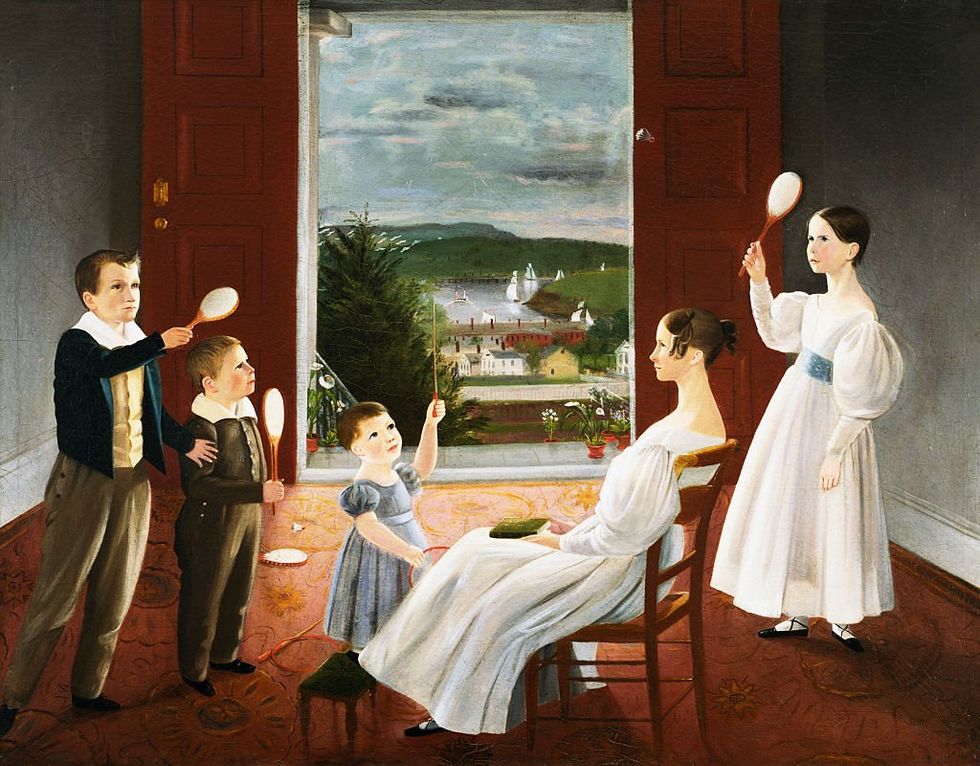Homemaking as your primary vocation


Growing up in the '70s, I was not interested in being a homemaker — although I confess I don’t recall that word being used as often as the less attractive term “housewife.” Which is kind of a dumb term, since it implies there can be a wife in several different locations!
But I was absorbing the cultural message that no woman with a brain wanted to stay home dusting. And although I had a wonderful mom, she went back to work when I was in elementary school, so my role model wasn’t a calm, productive homemaker but the typical working mom, short on time and long on hustle.
The woman may have dirty socks on the floor, too, honestly — but she’s bought matching throw pillows, has planted a pot of flowers on the patio, and is burning a scented candle.
So the dignity of home management as a vocation was an utterly foreign concept to me. But I would argue today that married Christian women should consider “homemaker” as their primary vocation. Even if you have a job doing something else, even if you’ve built a career you love, and regardless of whether children are part of your family at this time.
Hear me out, Christian ladies. This is about how God made us — although you don’t even have to believe the Bible to recognize the reality of it.
Real talk about guys vs. gals
If you’re single — male or female — managing your home is really a matter of handling typical housework and maintenance issues. You may have a roommate who bears some of those responsibilities, but the responsibilities themselves are fairly simple: planning and prepping food, cleaning, laundry, taking out the garbage, mowing the lawn if you have one.
Now, consider what you’ve seen of the average single man’s home or apartment vs. the average single woman’s. You know what I’m talking about. Although neatness levels vary widely in both genders, men are far less likely to buy a throw pillow or potted plant, and the stereotype is that they probably have dirty socks on the floor somewhere (remember, stereotypes are usually grounded in reality!). The woman may have dirty socks on the floor, too, honestly — but she’s bought matching throw pillows, has planted a pot of flowers on the patio, and is burning a scented candle.
The world recognizes this. Home Goods, which sells — well, home goods — has a whole ad campaign built around encouraging women to “go finding” things for their home. Although a few men show up in the commercial (somewhat unrealistically — I know of very few, if any, husbands who’d be excited to “go finding”), the ad clearly is targeting the people who love and enjoy buying things for their home. Look who that is (thumbnail photo notwithstanding):
So even advertisers understand that men and women are different in this area (although thumbnail guy was pretty excited about his artwork). It is simply a reality that women tend to naturally gravitate toward making their homes more beautiful.
Likewise, men tend to have a natural urge, once they’re paired with a woman, to protect and provide for her — if that instinct is not squelched by strident feminist rhetoric, which is sadly the case for some young men today.
But when a (godly) man marries, he takes on that God-given responsibility of protecting and providing for his wife. This does not mean she may not “provide” as well, but that is his focus. All of history supports this take — good men have always looked to protect and provide.
And what is her focus? Well, again, for most of history, it’s been the home. And she was the one driven to make a clean, attractive, and comfortable refuge — at least in times and places where life was more than just survival — but sometimes, even then.
Again, she may hold down a job, and he may help with the housework — but in most cases, she is the one responsible for what happens at home. This is why lots of women with demanding careers wish they could have a “wife” to take care of everything!
And this is why even women who can afford a full-time housekeeper, cook, chauffeur, and nanny still know that they are the ones responsible for keeping it all running smoothly. Managing a home is a complex business — and again, men don’t do it (generally speaking, but I’m going to stop using that term now, because I trust you know that I am not saying it never happens).
What’s more — biologically, women are literally made to nurture. Having babies means we build nests for them and us — at home. We aim to create safe, peaceful, and beautiful places to come home to. Places that refresh and recharge us and our husbands — places that serve as launchpads for our children to learn, grow, thrive, and be loved.
Not a bad system
When a woman knows that her husband will always take point on making sure they’re provided for, that frees her up to take point on making their home the best possible refuge for their individual family. Which, in turn, frees him to focus on being a better provider and protector, which, in turn, frees her up to be a better home manager — see how that all works?
None of this is to say that a wife can’t be the one, for example, who manages the finances — in fact, in many cases, that’s an integral part of home management. Likewise, a husband can be the one responsible for laundry or grocery shopping. It is also not to say that a woman can’t bring in income. Individual preferences or gifts make every couple’s approach unique.
However, there is something to be said for saying — husband, this big chunk of our lives together is primarily your responsibility — and wife, this big chunk of our lives is primarily in your hands. And those big chunks often seem to align neatly with how God made men and how he made women as well as aligning neatly with reality — even today.
Chief home executive-ing
So being a homemaker means managing not only the physical home but overseeing all that goes on there. It’s filling the role of chief home executive, and it’s much more than my ignorant younger self realized. It encompasses much more than dusting and diaper changes.
Managing a home faithfully and productively involves learning skills in:
- management
- organization
- planning
- research
- scheduling
- design
- nutrition and meal planning
- child development and education
- mastering the art of hospitality
Side note regarding the last bullet point. Biblical hospitality — which the Bible tells us repeatedly to offer to both other believers and those in need — is almost impossible to regularly practice when both husband and wife work outside the home. It’s awfully challenging to open our homes to outsiders when someone isn’t based there to help make that happen.
In any event, chief home executive is the most complex, challenging vocation one can undertake and arguably the most important. And that applies whether a male or female is in that role. But women are generally better at it.
Embrace the feminine
Also note that women nurture and create beauty and order even in the absence of children or husband — because again, that is how God made us. So single, married, or mothering, I encourage you to embrace those feminine instincts to bring beauty and order and calm to your home.
In the meantime, if you have another vocation, consider that job not your primary work but a means to the larger goal of facilitating a home that refreshes, recharges, and equips each family member to be the person God made them to be — as well as a home that can welcome outsiders.
But let’s leave it with this food for thought: If you meet someone new, and they ask what you do — how would you feel about saying (even if you have another job), “I’m primarily a homemaker”?
Originally Published at Daily Wire, Daily Signal, or The Blaze
What's Your Reaction?
 Like
0
Like
0
 Dislike
0
Dislike
0
 Love
0
Love
0
 Funny
0
Funny
0
 Angry
0
Angry
0
 Sad
0
Sad
0
 Wow
0
Wow
0









































































